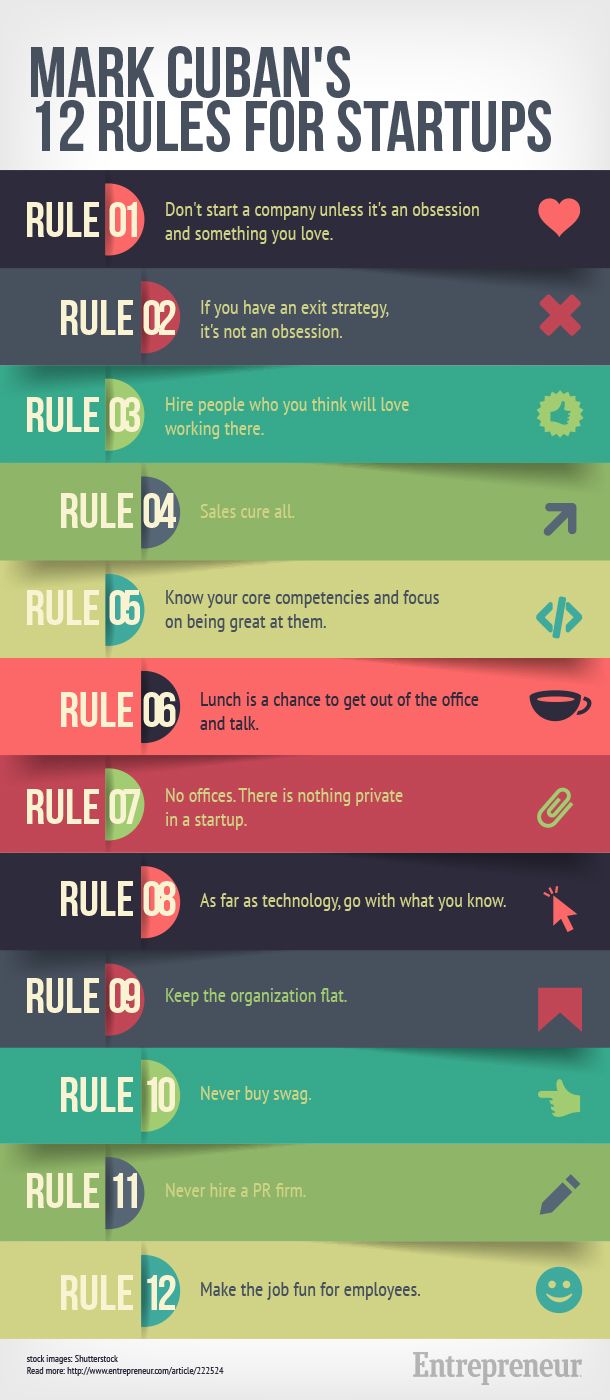Top 12 Success Factors Of Mark Cuban
Mark Cuban is a well-known entrepreneur and business mogul not only in the United States but also in many other countries in the world. He is one of the guys many young people want to be like, having accumulated a net worth of around $2.5 billion (2013) and being the manager and the founder of a bunch of successful businesses. Currently, he is best known as the owner of the National Basketball Association’s team Dallas Mavericks (The Mavs), he also stays behind Landmark Theatres, and Magnolia Pictures, and is the chairman of the well-known HDTV cable network – AXS TV. More interesting things about this famous entrepreneur, you can read on: The Story of Mark Cuban.
His experience in business is enormous and here he summarizes some of it, regarding starting a new business. These below are Mark Cuban’s 12 rules for building a successful and profitable startup. This article was originally published on Entrepreneur.com here: https://www.entrepreneur.com/article/222524, so they deserve the credit for it.
The 12 Rules For A Successful Start-UpFrom Mark Cuban

By kk+ (Flickr) (https://flickr.com/photos/kk/50083704/) CC-BY-2.0 (www.creativecommons.org/licenses/by/2.0) via Wikimedia Commons
Anyone who has started a business has his or her own rules and guidelines, so I thought I would add to the memo with my own. My “rules” below aren’t just for those founding the companies, but for those who are considering going to work for them, as well. Mark Cuban
1. Don’t start a company unless it’s an obsession and something you love.
2. If you have an exit strategy, it’s not an obsession.
3. Hire people who you think will love working there.
4. Sales Cure All. Know how your company will make money and how you will actually make sales.
5. Know your core competencies and focus on being great at them. Pay up for people in your core competencies. Get the best. Outside the core competencies, hire people that fit your culture but aren’t as expensive to pay.
6. An espresso machine? Are you kidding me? Coffee is for closers. Sodas are free. Lunch is a chance to get out of the office and talk. There are 24 hours in a day, and if people like their jobs, they will find ways to use as much of it as possible to do their jobs.
7. No offices. Open offices keep everyone in tune with what is going on and keep the energy up. If an employee is about privacy, show him or her how to use the lock on the bathroom. There is nothing private in a startup. This is also a good way to keep from hiring executives who cannot operate successfully in a startup. My biggest fear was always hiring someone who wanted to build an empire. If the person demands to fly first class or to bring over a personal secretary, run away. If an exec won’t go on sales calls, run away. They are empire builders and will pollute your company.
8. As far as technology, go with what you know. That is always the most inexpensive way. If you know Apple, use it. If you know Vista, ask yourself why, then use it. It’s a startup so there are just a few employees. Let people use what they know.
9. Keep the organization flat. If you have managers reporting to managers in a startup, you will fail. Once you get beyond startup, if you have managers reporting to managers, you will create politics.
10. Never buy swag. A sure sign of failure for a startup is when someone sends me logo-embroidered polo shirts. If your people are at shows and in public, it’s okay to buy for your own employees, but if you really think people are going to wear your branded polo when they’re out and about, you are mistaken and have no idea how to spend your money.
11. Never hire a PR firm. A public relations firm will call or email people in the publications you already read, on the shows you already watch and at the websites you already surf. Those people publish their emails. Whenever you consume any information related to your field, get the email of the person publishing it and send them a message introducing yourself and the company. Their job is to find new stuff. They will welcome hearing from the founder instead of some PR flack. Once you establish communication with that person, make yourself available to answer their questions about the industry and be a source for them. If you are smart, they will use you.
12. Make the job fun for employees. Keep a pulse on the stress levels and accomplishments of your people and reward them. In my first company, MicroSolutions, when we had a record sales month, or someone did something special, I would walk around handing out $100 bills to salespeople. At Broadcast.com and MicroSolutions, we had a company shot. The Kamikaze. We would take people to a bar every now and then and buy one or ten for everyone. At MicroSolutions, more often than not we had vendors cover the tab. Vendors always love a good party.

Mark Cubans 12 Rules For Starting A Successful Company
About Mark Cuban
Mark Cuban is a successful entrepreneur, investor, and television personality. He is best known for his role on the television show Shark Tank, where he and other investors evaluate potential investments. Cuban has made a name for himself in the business world and continues to be a driving force in the world of business.
Cuban was born in Pittsburgh, Pennsylvania on July 31, 1958. He attended college at the University of Pittsburgh and then moved to Dallas, Texas where he studied business at Indiana University’s Kelley School of Business. After college, Cuban worked as a bartender before founding his own software company called MicroSolutions. After selling MicroSolutions for millions of dollars in 1990, he began investing in start-up companies. His investments ranged from broadcast companies such as HDNet to tech giants like Yahoo!.
In 2003, Cuban famously bought the NBA team the Dallas Mavericks and has since been an influential leader within the league. Cuban has been both praised and criticized for his strong opinions on various topics within the NBA. He believes firmly in raising players’ salaries as well as increasing transparency when it comes to disciplinary action with players within the league. In addition to owning the Mavericks, Cuban is also known for his various appearances on television shows such as ABC’s Shark Tank and Dancing with the Stars.
Throughout his career, Mark Cuban has been a great example of how hard work can help someone achieve their dreams. He has become an icon in business and continues to be a driving force in multiple industries. Whether you like or dislike Cuban, it is undeniable that he will continue to be successful forever!
If you liked this article, you could click on one of the social buttons on your left, to share it with friends.





